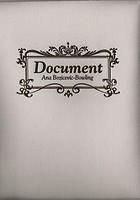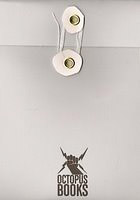
| Jacket 36 — Late 2008 | Jacket 36 Contents page | Jacket Homepage | Search Jacket |
The Internet address of this page is http://jacketmagazine.com/36/r-bozicevic-bowling-rb-thorburn .shtml
Ana Bozicevic-Bowling
Document
reviewed by Matthew Thorburn
24pp. Octopus Books (www.octopusbooks.net). US$8. paper
This review is about 4 printed pages long. It is copyright © Matthew Thorburn and Jacket magazine 2008.See our [»»] Copyright notice.
1
In Document, her second chapbook, Ana Bozicevic-Bowling offers her take on what Elizabeth Bishop famously termed “questions of travel.” But Bozicevic-Bowling eschews the matter-of-fact style of Bishop’s associational narratives–“Everything... connected by ‘and’ and ‘and’”–in favor of a style that is impressionistic and elliptical. While Bishop emphasized the sights and sites of her travels, Bozicevic-Bowling shifts the focus from facts to feelings. The 11 poems gathered here–including not one but two epilogues–register the thoughts and emotions, especially the sense of dislocation, that come with leaving one country for another, as well as the intangible things we carry within us wherever we go.

Paragraph 2
Born in Zagreb, Croatia, Bozicevic-Bowling emigrated to the United States in 1997. In one sense, the title Document suggests the passport, visas and other paperwork such a traveler needs to cross borders and start a new life. In fact, the chapbook is about the size of a passport and folds into a cover with a string and button closure reminiscent of an interoffice mail envelope.
3
But the title can also be read as an imperative. Document this, the poet seems to say. Get it down on paper. Don’t forget. The first poem, “Rhode Island,” opens with a direct address and a step-by-step documenting of how:
4
From water and wood
you build on the jetty
a shrine, and place
1 an acorn
2 a button
on the salt-worn planks.
5
This “you” might be read as a form of self-address. (In a Nabokovian twist, the chapbook is dedicated, mirror-like, to “its messenger.”) Indeed, this same “you” is addressed in several of the poems, and is also called “traveler.” Shifting quickly from the tactile to the marvelous, the poet shows how this traveler carries her family with her:
6
From your hat, when you upend it,
your small family upturn their faces.
7
This family, complete with hat, reappears later in the chapbook, in the poem “Then I write a letter in your handwriting”:
8
“Somewhere a pillowcase.
Somethere I allow
my head
out of the hat, & the oval mother
the incontinent father
walk down the brim.
Their sorrowful valises.

9
Here the family might be photographs, the mother an “oval” portait. But most likely they are imagined: loved ones brought along only in memory. Here the poet deftly sketches a private moment in an immigrant’s life, from the bending of English in that fanciful “Somethere” to the tender image of the “oval” mother (perhaps she is simply a bit overweight) and “incontinent” father making their way along the hat’s brim.
10
“Let’s double back, try to / describe: this solitude,” another poem begins, offering Bozicevic-Bowling’s ars poetica in a nutshell. And a similarly solitary figure, displaced in a new landscape, reappears in the book’s title poem:
11
He can always find work as a statue, or moonlight
as museum night-guard. Through greenery, days,
he still walks the park, in a scarf,
unaware he was made to endure...
12
While much is lost, or simply left behind, in starting a new life, much endures: memories, familial love, a certain way of living day by day. That clever break on “moonlight” shows the thread of bittersweet humor that runs through these poems, as does the man’s “unaware”-ness.
13
Boziecevic-Bowling’s poems move quickly from thought to thought, often dispensing with the in-between language of narrative, and counting on the reader to connect the dots. At its best, this leads to brief, dream-like poems such as “The Return,” in which we experience a flash of memory–a not-quite-story in which the action is never fully described or explained:
14
I’m almost crying, sewing, barking: almost slowing
down. What’s slain? Your name: a large curvy
European key. The hall-door opens. Hall smells
of an old lion’s thoughts in a Zoo. You enter, close
opened windows. Your room’s summerless.
15
What is happening here? I don’t know, though I keep returning to that “curvy” key and my imagining of what a lion–particularly an old one–might think. I once read how a certain novelist’s approach to fiction writing is to leave out one small but important piece of the story. Including it would clear up everything, but without it there’s a sense of mystery, the essential incompleteness that makes a work of art work. Boziecevic-Bowling’s poems seem to operate along this same line of thinking: what we experience in these poems are vital impressions; not the whole story, but the feeling of the story.
16
The closing poem, “Jointed Dawn,” offers the comfort of two kinds of connection. The poem’s stanzas are “jointed” with the words “dawn,” “blue” and “shadow,” and the book’s “you” is no longer a solitary figure, but a voice that has become a part of the landscape:
17
Sleep, the long doubt of the body
doesn’t survive the dawn —
Dawn, a high silver sound:
sky-sweeper, rose and blue.
Blue the patch between two roofs,
the one map that casts no shadow.
Your shadow is voice too low to hear:
now a voice joins in
from each-standing-thing.

Matthew Thorburn
Matthew Thorburn is the author of Subject to Change (New Issues, 2004) and the recipient of a 2008 Witter Bynner Fellowship from the U.S. Library of Congress. He lives and works in New York City.